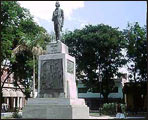The Anthem of Bayamo is the symbol of the Nation whose lyrics and melody were composed by Perucho (Pedro) Figueredo and sang in its original version on October 20th, 1868 whenthe city of Bayamo was taken by the independent forces. It was called ‘La Bayamesa’  since it was created in Bayamo and it was also present a clear allusion to the already known French Marsellesa. On Thursday,June 11th, 1868 in the Iglesia Mayor de Bayamo during a solemn Te Deum and for the festivities of Corpus Christine, before the presence of important personalities of the government and town of Bayamo, the music was presented for the first time. On October 18th, 1868 the taken of Bayamo was initiated and two days later at eleven o` clock in the evening the capitulation was signed. since it was created in Bayamo and it was also present a clear allusion to the already known French Marsellesa. On Thursday,June 11th, 1868 in the Iglesia Mayor de Bayamo during a solemn Te Deum and for the festivities of Corpus Christine, before the presence of important personalities of the government and town of Bayamo, the music was presented for the first time. On October 18th, 1868 the taken of Bayamo was initiated and two days later at eleven o` clock in the evening the capitulation was signed.
Between the joy for the activity and the constant humming of the music coming from the crowd, Figueredo picked from his pocket a pencil and paper and on the same saddle of his horse he wrote the verses out of the already known melody and he distributed it among the ones gathered. So, in this way in the people’s voices and with the airs of the combats for the liberation was giving life to the Cuban National Anthem.
Afterwards, the lyrics were object of few modifications, but still keeping his original objective. The lyrics go as follow:
To combat run ‘bayameses’
That our country looks over you with pride
Fear not a glorious death
To die for your country is to live
In chains, to live is to live
In insult and drowning shame.
From the bugle listen to the sound
Towards arms brave ones, run.
Bayamo has a wide net of ‘casa de la cultura’ (cultural houses), musical bands, chorus and it becomes wider with the work of its artists (painters, sculptors, etc.) Josè Fornaris was born there, a man from whose inspiration many generations thank that immortal piece that has survived through the years with the name of ‘La Bayamesa’.
This is the cradle of a singer and poet like Pablo Milanés, founder of the movement named the ‘nueva trova’. He is the author of numerous songs characterized by touching lyrics that go from love poems to vivid patriotic and political texts. A fair homage is paid with its cultural development to the city where the Cuban nationality began to arise.
|